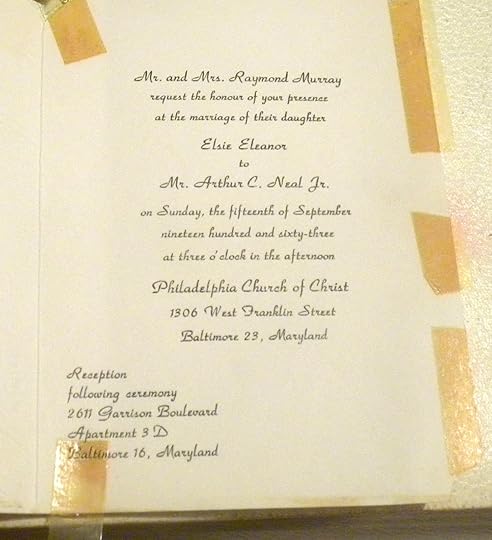Of Love and Tragedy in the Shadow of 50 Years of Struggle by Mark Anthony Neal
 Of Love and Tragedy in the Shadow of 50 Years of Struggle
by Mark Anthony Neal | NewblackMan (in Exile)
Of Love and Tragedy in the Shadow of 50 Years of Struggle
by Mark Anthony Neal | NewblackMan (in Exile)On September 14, 1963, a group of men in Birmingham, AL were implementing the final plans for a dynamite attack that would take the lives of four little girls in the 16th Street Baptist Church the next day. Those little girls are the most well known of the six Black children who would lose their lives to racial violence that day.
Hundreds of miles away in Baltimore, MD, Elsie Eleanor Robinson and Arthur C. Neal were putting the final touches on the next day wedding ceremony, that would mark the beginning of 45 years of matrimony (till death did they part), unaware that the date of their planned nuptials would linger forever in the American imagination.
In the years that I shared the earth with my parents, they never once mentioned the drama that played out that day in Birmingham, even in relation to their wedding day. The historical connection only became apparent to me a few months ago, as I sat at a public viewing of Spike Lee’s Four Little Girlswith my ten-year-old daughter Camille, and had one of those a-ha moments.
I’m sure there are thousands of Black partners, who can mark the boundaries of their love and commitment to each other around the violence, trauma and tragedy that our community bore witness to during the Jim Crow era and the valiant struggle for Black Freedom that the era inspired.
Just as I am sure that the pain of those days—which drove my father from the deep south to New York City in the first place—were largely the reason that my parents never felt compelled to talk to me about that day in Birmingham, that day in America, or any of the everydays that undermined this country’s stated belief in liberty and justice for all.
My parents were not movement people. The only hints I ever had of their awareness of the events that shaped the world that they birthed me into were the ever present dime-store portraits of Martin Luther King, Jr. and John Fitzgerald Kennedy, a large blue-and-white button from the Poor People’s Campaign (which they never uttered a word to me about) and the “Jimmy Carter 1980” button they came home with after attending a campaign dinner for the then President. Carter’s 1976 campaigned was the first time my father registered to vote.
Yet both my parents were members of powerful municipal unions in New York City. My mother, the more active of my two parents, never, ever, explained why she dragged me along to labor meetings, though by age 10, I knew who Charlie Hughes—the president of Local 372—was. Hughes led a union largely comprised of Black and Latino women school lunch workers; it was his activism that granted those women to summer salaries and the kinds of benefits that my mother used to earned her college degree, and later Master’s degree—and leave the lunchroom for the classroom, where she became a classroom aide, and later Special Education teacher.
These are the kinds of victories that often get left out of the official details of the Civil Rights era, and perhaps, the reason why folk like my parents, didn’t see any significance in the lives they lived in the shadow of the movement. Indeed the story of the movement is really about the people who took no official stances, did not participate in any marches or join any organizations of note, but who simply continued to live lives of integrity and meaning, despite the tragedies that broke out among them, often on a daily basis.
The ten year-old who watched Four Little Girls with me that recent summer day possesses a natural curiosity and memory, that makes clear that she will be the family historian. Though her grandparents might not have found any added significance to their lives, I’m sure she will never fail to remind her children of the great-grandparents who were married on a day that changed America forever—yet still continued to live lives that make their own lives possible.
Published on September 14, 2013 17:22
No comments have been added yet.
Mark Anthony Neal's Blog
- Mark Anthony Neal's profile
- 30 followers
Mark Anthony Neal isn't a Goodreads Author
(yet),
but they
do have a blog,
so here are some recent posts imported from
their feed.



